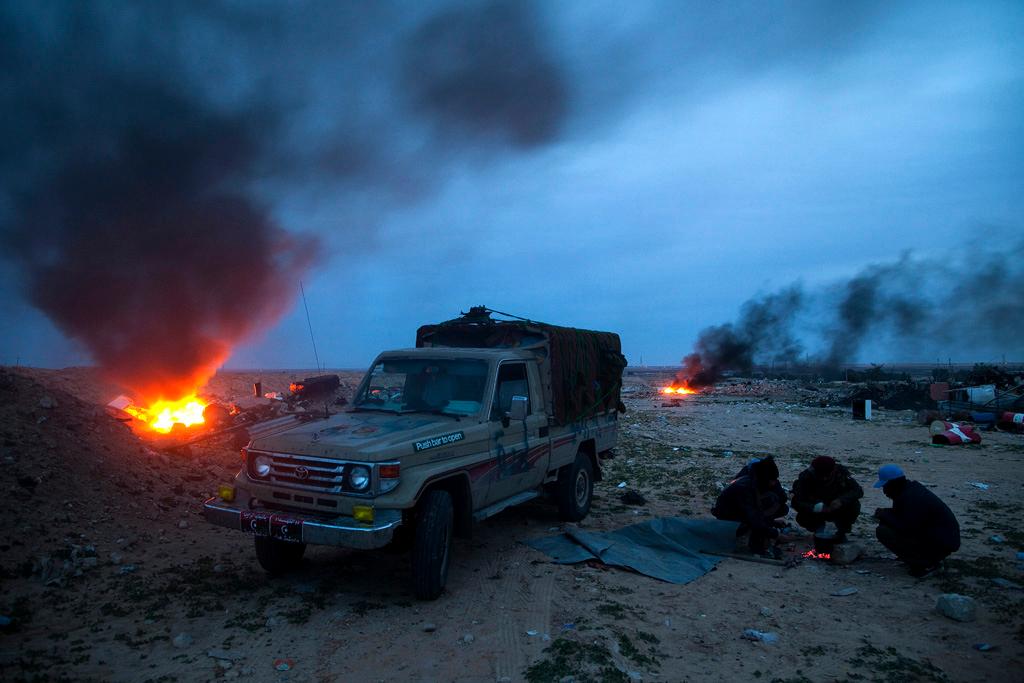Libya: A day in the life of a rebel
Rebel fighters make tea at the Brega checkpoint, now in government control, besides burning tires that had been lit by the fighters to provide cover from air strikes.
RAS LANUF, Libya — What most accounts of war skip over is the boredom, the long stretches of idle time spent waiting to attack or be attacked.
“What can we do?” said Said Bugofor, 35, a petroleum engineer, with a shrug. “We sit with our weapons, we eat, we fight.”
The daily life of this ragtag band of protesters turned rebel fighters is ad hoc. When ammunition needs to be moved, or weapons cleaned, men rally to do so. Far too much ammunition is wasted though, as fighters burn off nerves shooting Kalashnikovs and anti-aircraft guns into the sky.
With the rebels losing ground on two fronts, many have come to support the opposition in whatever way they can, even if there was really no way to help.
“I have no gun but still I came here,” said Ahmed Fakri, 30, the owner of a small grocery store in Ajdabiya. “I bring wood for the fire, or move boxes. It’s what I can do for our freedom.”
Like Ahmed, many of these so-called “rebel fighters” are barely trained. They are students, engineers, teachers; civilians who have seized this opportunity to rid themselves of their despised leader, Muammar Gaddafi. The soldiers that have defected from the Libyan army to join the opposition struggle to pull together this group of men against the far more organized and better-equipped government forces.
Some of these soldiers are still children themselves. Holding a rifle larger than his small frame, Ali Abdul Karim claims to be 14 but looks even younger.
“Inshallah, I will fight,” he said stubbornly, “I want to kill Gaddafi.” He had left home the day before without telling his mother and hitched a ride with some soldiers to the front line.
He’s not alone up here. As much as anything, these uprisings are fueled by the longstanding frustrations and thwarted aspirations of Libya's youth, many of who have joined the opposition.
As the fighting continues and the rebel forces are pushed further east — first from Bin Jawad, then Ras Lanuf, and from Brega on Saturday — the group has thinned out more and more. The men are tired, they say, and want to see their families.
Those that stay sleep huddled together, crashed out in cars or within the walls of the mosque, even their heads covered beneath Chinese-made neon blankets. The days heat up here in the desert but the nights remain frigid.
With dawn fires are lit around the checkpoint near the Ras Lanuf oil refinery, formerly in opposition control. Men wake slowly and the “shabab,” literally “young men,” gather around its warmth, making tea and cracking jokes.
Most days the fighting here begins in the afternoon. The cloud cover burned off planes can be spotted overhead. But in the mornings it is time to rest, pray and eat.
“This food is brought to us by the people,” said Mohammad Ghoja, a shopkeeper who was distributing food to rebels at the Ras Lanuf checkpoint. “They know we are fighting for them.”
The fare is basic at best. Cans of tuna, processed cheese and bread make up most meals, and juice boxes and bottles of water are passed out to soldiers and journalists alike.
Even prayer can be a time of danger out here. On Thursday a rocket slammed into a mosque in Ras Lanuf, covering the worshippers in dust and rubble. The next day at the oil refinery checkpoint rounds of artillery thundered in the background of the cleric’s words.
As the day turns dark and the fighting slows talk turns to where this conflict — be it a revolution or civil war — might lead. A bus full of fighters had just left the Brega checkpoint, heading east to Ajdabiya, now the westernmost bulwark of Libya’s “free east.” By the next afternoon this place would be pitted with holes where mortar and artillery sent by government forces had hit, and at least six men would be dead.
Muhamad Abdullah, 28, a university graduate without a job, watched the bus drive off from his seat on an empty ammunition box.
“Well, you only die once,” he said.
Every day, reporters and producers at The World are hard at work bringing you human-centered news from across the globe. But we can’t do it without you. We need your support to ensure we can continue this work for another year.
Make a gift today, and you’ll help us unlock a matching gift of $67,000!
